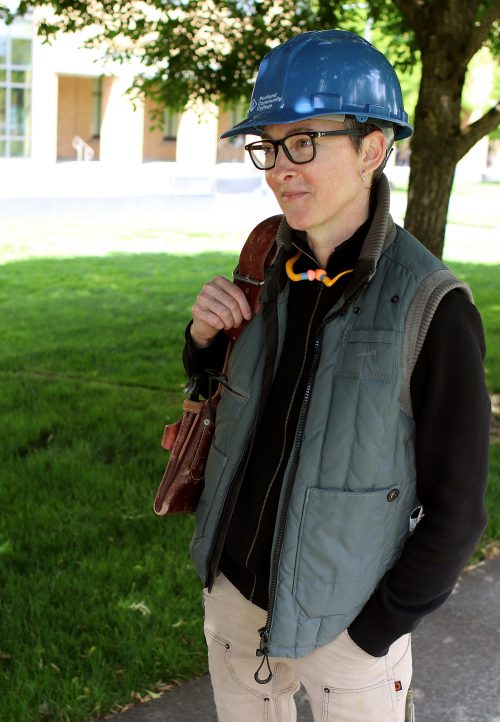This content was published: June 3, 2021. Phone numbers, email addresses, and other information may have changed.
Amy James Neel uses carpentering experience in new role with PCC
Photos and Story by Katherine Miller
At Portland Community College’s Office of Planning & Capital Construction (P&CC), Workforce and Contracting Equity Manager Amy James Neel is focused on diversity and equity for work funded by the 2017 voter-approved bond measure.
James Neel came to PCC with years of experience as a journey-level carpenter and training director with Oregon Tradeswomen, so she knows first-hand the challenges faced by minorities in the industry. She said that one of the obstacles is “occupational segregation and gender socialization” and that growing up she was unaware that construction work was even an option.
“As a child I was physically active,” she said. “I loved to build things and take things apart, and someone along the way should have identified the construction trades as a possible career path for me. But it didn’t happen, so I didn’t know the industry was open to me until one day — literally — I saw a woman in a hard hat.”
With that epiphany James Neel decided to leave her pre-law studies at university and become a carpenter. She said she loved the work and appreciated that she could earn a solid income. But she also came to understand why there were so few workers “who looked like me.”
“I saw so many women leave the industry not because of the work itself but because the climate of the workplaces drove them out,” she said. “The job site culture wasn’t great, and, in some cases, it was hostile.”That’s why James Neel is so passionate about the college’s training and education about racism, sexism, harassment and bullying in the workplace. PCC and a coalition of construction industry stakeholders signed on to the Safe From Hate pledge in summer 2020, agreeing to enforce a zero-tolerance policy for hostile behavior; provide cultural education on job sites; recruit diverse talent; and cultivate retention and leadership development on job sites.
Respectful workplace training is a part of the educational component and includes new worker orientation, supervisor and manager training, marketing and jobsite materials and mentorship. As a result, the college’s project management team, and its contractors with projects over $5 million, have been engaged with implementing approved workplace training. P&CC Director Linda Degman said that creating inclusive and respectful work sites is essential in order to build systemic change in the construction industry.
“Our goal is to grow the capacity of underrepresented workers on the sites so women and people of color can grow their skill sets and advance into journey-level positions,” Degman said. “This in turn creates the opportunity for these workers to start their own firms, if that is their goal.”
That change is happening. For instance, at the Rock Creek Campus more than 37% of the contracts are going to certified minority- and women-owned firms, emerging small businesses, and service disabled veterans (MWESBSDV), well above the 20 percent considered the minimum.
“When I founded our firm 17 years ago, there was a dearth of minority-owned architectural firms in Portland,” said Joann Dao Le, principal for Dao Architecture, which has worked on PCC projects. “This may still be the case today, but there appears to be at least more women-owned design firms, which is a move in a positive direction. I also see more faces of color in project meetings, in offices and sometimes on the job sites.”
Dao Architecture has collaborated with PCC on several smaller projects, including in Portland’s most diverse districts. The college’s mission of ensuring equitable access to both its students and the community is one reason the firm values its partnership with PCC.
“We try to build a diverse practice, lead by example and serve as a role model for those who see a design lead who looks like them, and points to the possibility of a meaningful architectural career,” said Dao.

